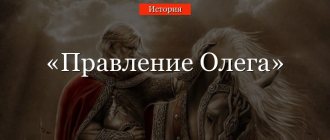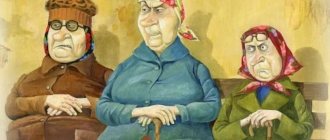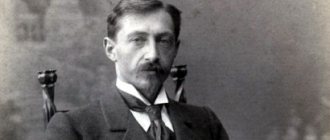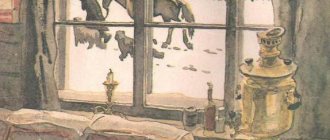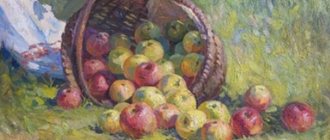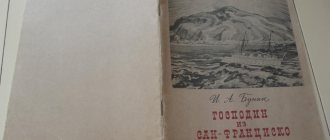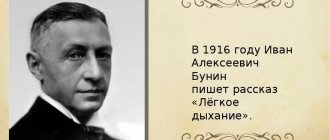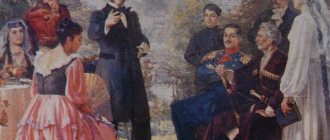General characteristics of the work
Ivan Alekseevich worked on the story “The Village” for 10 years, from 1900 to 1910. The readers are presented with the undoubted doom of the Russian province at the beginning of the 20th century, at the same time the author very clearly and expressively describes the patriarchal system, which is gradually being replaced by the new era that has come. The countryside in this work seems to be a real kingdom of hopelessness, hunger and inevitable extinction.
Bunin set himself the goal of showing the true appearance of the Russian people without any embellishment. The writer reflected in the story what he himself had to contemplate; the work demonstrates the poverty of the peasants, their extreme inertia and unwillingness to change anything in life, indifference and cruelty towards other people.
The main theme of this story is speculation about who exactly is to blame for the sad situation of the villagers. One of the central characters of the work, named Kuzma Krasov, is confident that no guilt lies with the unfortunate farmers. At the same time, Tikhon Krasov, Kuzma’s brother, believes that it is the peasants who are responsible for the wretchedness and hopelessness of their own existence.
Tikhon becomes in the story the embodiment of a reasonable and prudent rural owner of the new time, and Kuzma is an intellectual trying to find an explanation for the current situation. At the same time, Ivan Alekseevich believes that the peasants are still to blame for their suffering, but the writer does not propose any specific measures to improve the lives of the people.
"Village"
The story “Village” is one of the first major prose works by I.A.
Bunin, which immediately put him on a par with the most famous writers of the early 20th century. At the center of the story is the fate of two Krasov brothers: Tikhon and Kuzma. Both of them are descendants of serfs. However, in the new economic conditions, Tikhon, a man with a strong-willed character, quickly went up the hill and bought the very estate whose owner had once hunted his great-grandfather with greyhounds. Having become the owner of Durnovka (the self-explanatory name of the village recalls the absurdities and contrasts of Russian life in general), Tikhon Ilyich showed himself to be an imperious owner: “He watched every inch of land like a hawk.”
Through the description of the life of the Krasov brothers and other heroes of the story, a panoramic picture of the life and morals of the Russian people emerges: poverty, superstition reign all around, and there are rumors of upcoming riots. However, Bunin, as you know, was an opponent of social revolutions and tried with all his might to reconcile the interests of the master and the peasant, believing that the life of a wealthy peasant and an impoverished nobleman in Russia was approximately the same.
The disorder of Russian life is clearly emphasized in the story by the interior. In Tikhon Ilyich’s house there is a dirty heavy blanket in the hallway, and two large sofas are overflowing with live and crushed dried bedbugs. What can we say about the poor peasant’s hut, which I.A. describes? Bunin uses the example of Gray’s dwelling, where there is no light, people live in the same room with cattle, and in the middle of the hut a hungry baby is writhing in a cradle screaming.
Tikhon's brother Kuzma is a less practical person. He is an anarchist by conviction and writes poetry. Transferring control of the estate to him, Tikhon thinks: “Unreliable brother, an empty man, it seems, but as long as he’ll do!”
In the disputes between Kuzma and Balashkin I.A. Bunin is trying to embody the polemic about the Russian people.
Kuzma often thinks about why he lives in the world, and is bitterly aware of his hopeless loneliness.
A special role in the story is played by the image of Young, who, at his master’s whim, was taken by force by Tikhon Ilyich, then disgraced by the bourgeoisie. This is the image of a powerless Russian woman, persecuted by poverty, hard physical labor and bondage.
Having raped Young, Tikhon Ilyich shows imaginary concern for her. Helping her first husband, who brutally beat the woman, leave for another world, he marries her to Deniska, promising her a rich dowry. This wedding, in fact, is of no use to anyone. The young woman is a calm, economical woman. She has a naturally good heart. This is evidenced by her attitude towards old Ivanushka, whom she tenderly and carefully feeds. “She smiled only at him,” writes I.A. Bunin. How many unspent tender feelings are hidden in the heart of this woman, who is not spoiled by fate.
Having learned about the upcoming wedding with Deniska, Molodaya first agrees to it in order to somehow arrange her destiny. The newlyweds are given gifts; a pig was slaughtered for the wedding. At the last moment, Kuzma, who dissuaded Young from this marriage, asks her: “Should we drop this whole story?” However, she feels that it is awkward to refuse, since expenses have already been incurred because of her.
In the wedding scene, this idea of a wedding that no one needs looks even more ridiculous. Pain and sadness are heard in the words of the author when he writes: “And the hand of the Young One, which seemed even more beautiful and deader in the crown, trembled, and the wax of the melting candle dripped onto the frills of her blue dress...”.
The author's concern for the fate of Young in this unequal marriage is associated with pain for the fate of Russia. The village of Durnovka in the story symbolizes, in fact, our entire long-suffering country. And the central characters of the work - the Krasov brothers - are two sides of Russian life: the desire from village to city, and from city to village.
Source
Composition of the story
Events develop in a village called Durnovka, which has become a collective image of many similar villages. With this title, the author emphasizes how unreasonable the entire existence of the peasants is. The story is divided into three parts. In the first of them, Tikhon Krasov is the main character; in the second, the writer’s attention is focused on his brother Kuzma; in the final component of the work, Bunin sums up the lives of each of his relatives. Their destinies reflect the numerous problems of the Russian village, and the brothers are in many ways completely opposite to each other.
Tikhon, born into a family of serfs, manages to become a wealthy man and the owner of an estate. A man has no doubt at all that money is the main value in life; he spends all his energy and ingenuity on increasing his own capital. However, Tikhon's brother Kuzma is completely different, he thinks bitterly about what awaits Russia in the future, he is sincerely upset by the ignorance, extreme poverty and backwardness of the peasants.
Option 2
As a writer, Bunin is known for the fact that he always tried to show life, especially peasant life, from its most unpleasant sides. Emphasizing these aspects in his works, he tried to show how poor this life is, and that something needs to be changed. This something changed from work to work.
The work “Village” tells us about the fate of two Krasov brothers Kuzma and Tikhon, living in the village of Durnovka. But because of something, their paths diverged. Kuzma went to work for hire, and his brother rented an inn and opened a tavern, he even bought the manor’s estate from the impoverished owner, but this brought him little happiness, since he had long wanted children, but his wife gave birth to all the children stillborn, which is very affected him.
Soon he began drinking in the same pub. Having reached old age, he realized that he had nothing to remember about his life, nothing to tell anyone, he was left completely alone. Reflecting on this, he remembers his brother and decides to make peace with him.
Kuzma is a completely different person by character. He tries to develop as a person, improving in literature and other sciences. But seeing all the injustice of life, he becomes disillusioned with everything, starts drinking, and sinks lower and lower. Tikhon finds him and invites him to live in his estate, something he happily agrees to. However, after a while in the estate, he becomes bored, and he goes to his brother, asking him to help him arrange the wedding of one of the villagers. His brother helps him with this, which is where the story ends.
In the story, the author shows us life as it is. Cruel, unfair, poor in good things, exactly as people far from delusions see her. For this it is customary to appreciate this author. He is trying to convey to us this idea, the idea of the poverty of the country's population at that time. I believe that this is exactly what the author was trying to convey to us.
Images of the Krasov brothers
Demonstrating to readers the personality of Kuzma Krasov, Ivan Alekseevich shows in the image of this character the emerging qualities of the new psychology of the people. Kuzma, thinking about the laziness and lack of development of the inhabitants of the village, comes to the conclusion that, in addition to difficult circumstances, the people themselves are guilty of leading an almost animal existence.
At the same time, Tikhon, on the contrary, is a prudent and calculating person who always thinks mainly about his own good. Tikhon resorts to any means to enrich himself, but he is also overcome by deep despair when he thinks about the future of his native country.
The brothers constantly argue among themselves, and in their conversations the writer shows both the dark and light components of the men’s existence, reflecting the complete decline and degradation of the peasants’ world. In the last part of the story, Tikhon and Kuzma, whose life path is already approaching completion, experience real despair. Kuzma suffers from loneliness, and Tikhon worries about the lack of heirs and the collapse of his usual village way of life. Despite all the differences between the brothers, both feel superfluous and useless to anyone in the life around them.
Bunin's perception of the revolutionary movement
In this work, Ivan Alekseevich gives a clear and objective assessment of contemporary Russia. The author emphasizes that those who were called “rebels” in those days were stupid, narrow-minded and rude people who had not received any education. According to Bunin, all their attempts to somehow improve the situation are doomed to failure, since these people cannot change anything in their own consciousness and attitude, which remains frozen and inert. The village that the author shows to readers is a very sad sight.
Peasantry in the story
Bunin openly demonstrates all the extremely unpleasant qualities inherent in men, in particular, assault towards wives and children, ruthless treatment of animals, and incessant alcohol abuse. Many of the residents of Durnovka are absolutely unaware of what is happening around them; they are unable to perceive any new impressions.
A certain Gray lives in the village, existing in conditions of complete poverty, despite the fact that this man has a considerable amount of land. Not wanting to work, the peasant lives in an unheated hut, and his children are afraid of the light, having become accustomed to being in the dark.
In the image of one village, the author represents the whole of Russia. Ivan Alekseevich believes that men are only capable of spontaneous rebellion, which in any case will not lead to any results. Bunin mentions that once the inhabitants of the district villages began to protest, but their actions were limited only to the burning of several estates.
Brief summary of the work “In the Village”:
As a child, I thought that after the Christmas holidays spring comes. But in December it is still a real cold and gray winter. At the end of December, Christmas tree decorations and shiny decorations appeared in stores. And there were a lot of Christmas trees on the market. At this time I was looking forward to a holiday and knew that I would soon go to the village for the entire holiday. This means I will be celebrating the beginning of spring there.
The long-awaited day came when my beloved dad arrived, I spent the whole evening next to him. And I fell asleep dreaming that tomorrow we would go to the village.
I really enjoyed riding the train past the snow-white fields. The carriage was full of people and there was noise.
So we arrived at the station. Next we were carried by three horses. It was quiet all around. I sat in the sleigh, leaning back, and heard only the sounds of the bell and the clatter of horse hooves. The horses ran quickly, and then began to walk. The coachman waved his whip menacingly, and the troika accelerated again.
Night came and we arrived at our native village. I was happy and enjoyed the starry sky.
In the morning I ran around the house, looking at the frosty patterns on the windows. But the mood was spring and especially joyful. After tea I asked my dad to go skiing. I went out into the fresh frosty air and got on my skis. Seeing a garden covered with frost, I wanted to go there and hurried into the thicket. And from the garden to the pond. By the pond I liked to shake the willow branches and feel the frost falling on my face.
By lunchtime it became sunny, I began to notice drops from the roofs. And I only thought that spring was coming. I rejoiced at nature, the countryside, and the imminent arrival of spring! All the holidays I admired the village and the arrival of warmth.
It was sad to leave, but I knew that summer was coming and I would come back here again. Dad told me that when I grow up, I will understand that I need to live closer to nature, love my native village and help the village people in their work.
As we drove through the village, I tried to get enough of the village. I imagined how in the spring even simple huts would look cheerful. We stopped to feed the horses near a brick house where a wealthy family lived. I liked going into such huts, because there is a special working atmosphere there, everyone is working.
Again we drove around the village, and I kept admiring the nature. So we went out into the field. I thought that the thaw had begun and imagined nature awakening from its winter sleep.
